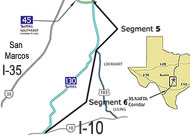Link to article here. And who will get this toll revenue? Cintra, a Spanish company, and its minority partner, Zachry. So a PUBLIC agency is expressly manipulating our interstate speeds to line the pockets of a private, foreign company!
Texas: Speed Limit May be Lowered to Boost Toll Revenue
Toll road contract in Texas allows state to lower speed limits on nearby interstate freeway to avoid paying penalties to a private company.
October 19, 2007
 The Texas Department of Transportation (TxDOT) has agreed to consider lowering the maximum speed limit on a stretch of interstate highway that competes with a planned toll road. Cintra-Zachary, a joint Spanish-US venture, paid TxDOT $1.3 billion for the right to collect tolls on 40-miles of State Highway 130 set for construction beginning in 2009. Although TxDOT suggested that free market competition was part of the goal of using a public-private partnerships to construct and operate roads, the contract it signed on March 22 to construct this portion of SH130 was specifically designed to limit the desirability of alternate, free routes.
The Texas Department of Transportation (TxDOT) has agreed to consider lowering the maximum speed limit on a stretch of interstate highway that competes with a planned toll road. Cintra-Zachary, a joint Spanish-US venture, paid TxDOT $1.3 billion for the right to collect tolls on 40-miles of State Highway 130 set for construction beginning in 2009. Although TxDOT suggested that free market competition was part of the goal of using a public-private partnerships to construct and operate roads, the contract it signed on March 22 to construct this portion of SH130 was specifically designed to limit the desirability of alternate, free routes.
“The compensation amount owing from TxDOT to Developer on account of the competing facility shall be equal to the loss of toll revenues, if any, attributable to the competing facility,” the contract states. (11.3.2.1)
The provision ensures no improvements can be made to nearby roads unless the agency issues payment to the Spanish-US private consortium with taxpayer funds. TxDOT can reduce the amount of compensation owed, however, if it agrees to increase toll revenue by imposing a “decrease in the maximum daytime posted speed limit for passenger vehicles on all or a substantial portion of I-35 where it runs generally parallel to the Facility.” This means that TxDOT can recover money generated by additional tolls as motorists abandon I-35 because of the lowered limit and increased congestion.
The net effect of the clause is to dissuade, without prohibiting, any improvements on competing roads. TxDOT has argued that it is strapped for cash and therefore has no alternative but to turn to private sector tolling to fund new roads. Future improvements to free lanes would become less likely when the agency must pay not only the cost of labor and materials, but a compensation to nearby toll road operators as well.
In the past, so-called “non-compete” language in tolling contracts resulted in a blanket prohibition on the construction of new roads or engineering improvements intended to ease congestion. Non-compete clauses raised public anger in the case of the SR91 Express Lanes in Orange County, California. More recent agreements have tended to focus on introducing “traffic calming” measures on competing roads intended to drive traffic off of pay roads and onto toll roads, as was seen last year in Sydney, Australia’s Cross City Tunnel (view parliamentary report on the tunnel).
TxDOT has also reserved the right to add contract language that would limit improvements to free roads near the planned Trans Texas Corridor toll road.
“The foregoing rights shall be subject to any covenant regarding competing facilities that may be entered into in connection with the development and operation of a Facility,” the agency’s TTC-35 Comprehensive Development Agreement states. (18.2)
Excerpts from the competition portion of the SH130 contract are available in a 351k PDF file at the source link below.
Source: ![]() Facility Concession Agreement, SH130 Segments 5 and 6 (Texas Department of Transportation, 3/22/2007)
Facility Concession Agreement, SH130 Segments 5 and 6 (Texas Department of Transportation, 3/22/2007)


Ve hav vays to make you cooperate and bow down to de power of de state!